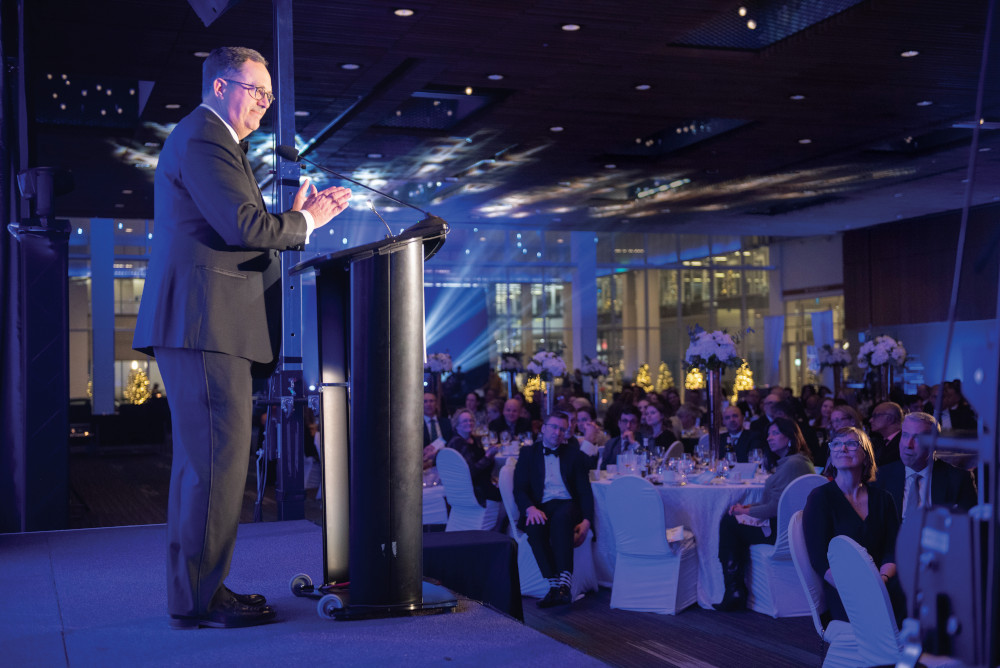
The Max Rady College of Medicine reached a significant milestone in 2023, marking 140 years since it was founded in 1883 as the Manitoba Medical College.
Four hundred alumni, partners, faculty members, learners and friends of the college came together in November to celebrate the anniversary at an elegant gala at the RBC Convention Centre.
The celebration, attended by many notable Manitobans in health education, health research and health care, raised $96,000 in support of bursaries for medical and graduate students.
“Many of us in this room … have had the great fortune to experience a University of Manitoba education, which prepared us for our amazing careers as physicians, scientists and leaders in our professions,” said the evening’s emcee, medical alum Tito Daodu [B.Sc.(Med.)/13, MD/13], a pediatric surgeon at the Alberta Children’s Hospital.
Daodu (pictured on our cover), who emigrated from Nigeria as a child, holds a master’s degree in public health and is passionate about health equity and anti-racism in medicine.
Among the honoured guests were philanthropists Ernest Rady [BComm/58, LLB/62, LLD/15] and his wife Evelyn [BA/60, BSW/61, MSW/67], whose landmark 2016 donation of $30 million to support the health sciences at UM was recognized in the naming of the Rady Faculty of Health Sciences and the Max Rady College of Medicine.
At the podium, Rady, a UM alum in commerce and law who now lives in California, spoke warmly of his father, Max Rady [MD/1921], a Russian Jewish immigrant who graduated from the UM medical school more than 100 years ago.
Sounding a theme of community service that was echoed throughout the evening, Ernest recalled how Max and his wife generously cared for people in need.
“The college of medicine is where my father got his start, and it allowed him to make a difference in the lives of so many people,” he said.
Peter Nickerson [B.Sc.(Med.)/86, MD/86], dean of the Rady Faculty of Health Sciences and the Max Rady College of Medicine, spoke of the distinguished history of the medical college, which was the first to be established in Western Canada.
The college has a long tradition of excellence, he said, not only in educating physicians and serving the community, but in advancing medical science. Its researchers now bring in more than $100 million per year in external grant funding.
“We are known for being exceptionally collaborative, forging effective external partnerships, and reaping the benefits of intergenerational chains of research mentors and mentees,” Nickerson said.
Of the 13 exemplary UM alumni or faculty members who have been inducted into the Canadian Medical Hall of Fame, four were in attendance: cardiovascular researcher Dr. Naranjan Dhalla, academic and medical leader Arnold Naimark [B.Sc.(Med.)/57, MD/57, M.Sc./60], geneticist Dr. Cheryl Rockman-Greenberg and infectious disease expert Allan Ronald [B.Sc.(Med.)/61, MD/61, D.Sc./11].
UM President and Vice-Chancellor Dr. Michael Bennaroch described the college as “exceptional, visionary and innovative.” He said UM is at the centre of efforts to strengthen health care in Manitoba, taking steps such as increasing enrolment in its medicine, nursing and respiratory therapy programs.
Minister of Health, Seniors and Long-Term Care Uzoma Asagwara commended the medical college for advancing equity, diversity and inclusion.
“Doing the work of decolonizing, committing to anti-racism, lifting people up … sends a message to everyone that the diversity of our province is truly our strength,” Asagwara said.
In a video segment, Andrew Ajisebutu [MD/19], a neurosurgery resident, emphasized the Max Rady College of Medicine’s commitment to social accountability.
“My first day at UM really set the tone,” Ajisebutu recalled. “The lecturer said, ‘If you compare the life expectancy between members of [the south Winnipeg] community and those in a 10-block radius around the Health Sciences Centre, the difference is about 15 years.’
“And what I really love about UM is that we do not shy away from the challenges that members in our communities face.”
Marcia Anderson [MD/02], the Cree-Anishinaabe physician who is vice-dean Indigenous health, social justice and anti-racism of the Rady Faculty, said it is important to recognize that the medical college has not always treated people equitably.
“By acknowledging and reflecting on where we have gotten it wrong, and where we still do, we give ourselves the opportunity to learn and grow,” she said.
Ongomiizwin, the Anishinaabe name of the Indigenous Institute of Health and Healing in the Rady Faculty of Health Sciences, has been translated as “Clearing a path for generations to come.”
“We are all Ongomiizwin,” Anderson said. “We are all responsible for clearing the path … and [for working] to ensure that the path is a more equitable, just and fair one.”
To contribute to the Max Rady College of Medicine 140th Anniversary Student Support Fund, visit https://bit.ly/UM140Med.
BY ALISON MAYES
‘We can do better’
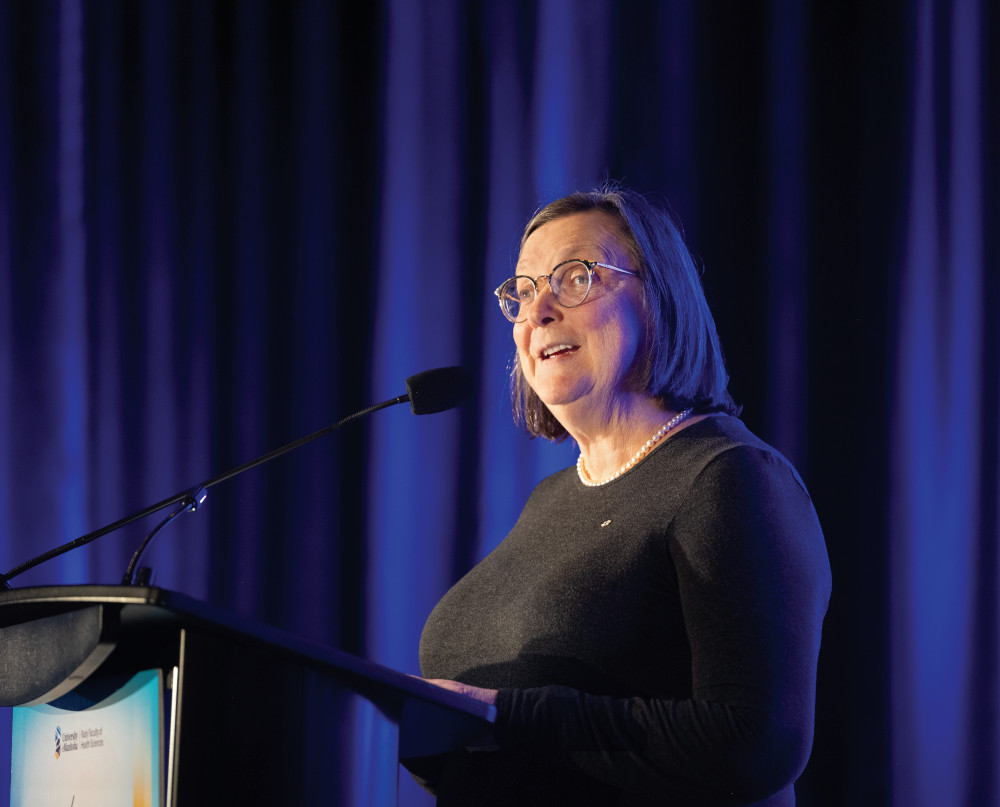
It’s time for Canada to introduce a basic income program, health economist Dr. Evelyn Forget told the audience overflowing with health professionals at the 140th anniversary gala for the UM medical college.
A federal benefit to ensure a minimum standard of living for everyone would alleviate the poverty and inequality that underlie many health and social problems, the UM professor of community health sciences said in her keynote address.
“Anyone in the health-care field recognizes the toll that poverty takes on well-being,” said Forget, a renowned expert and author on the feasibility of basic income.
“It’s something everyone in this room understands … because we’re dealing with the consequences of poverty in our hospitals, our clinics, our schools and our prisons. I think we can do better.”
Trials of basic income programs, including the famous Mincome experiment conducted in Manitoba in the 1970s, have disproven myths, such as the belief that recipients will quit working, the economist said.
Research shows that an unconditional basic income gives people the capacity to stabilize their lives and obtain more education and job training, Forget said.
“It eliminates the kind of desperation that can drive people into dangerous and demeaning work,” she added, noting that the Final Report of the National Inquiry into Missing and Murdered Indigenous Women and Girls calls for a basic income.
People who are no longer struggling with basic needs have reduced stress and more capacity to look after their health, Forget said. When she analyzed the Mincome data, she found 8.5 per cent fewer hospitalizations among the basic income recipients, compared to a matched control group.
“If we recognize that we’re all paying a very high price for the poverty we allow to persist right now, a basic income starts to look like a really good investment,” she said.
Medical College Voices
Two videos were created to share reflections from faculty members, alumni and students on the 140th anniversary of the Max Rady College of Medicine. Here’s a selection of edited quotes from the videos:
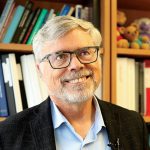
“[In my pediatrics residency] I got the quality of education I couldn’t have gotten anywhere else in Canada. Then, to lead that residency program [as chief resident] provided me leadership skills that I still use to this day.”
Terry Klassen [B.Sc.(Med.)/82, MD/82], professor, pediatrics and child health; Canada Research Chair in clinical trials; CEO and scientific director, Children’s Hospital Research Institute of Manitoba; academic director, George & Fay Yee Centre for Healthcare Innovation
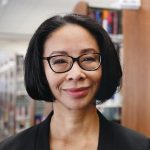
“As an MD alum, I am so proud of our leadership on issues such as social accountability, Indigenous health, interprofessional collaboration, and our anti-racism initiatives. I know our future is in good hands and we’re going to continue to lead on all of these important issues.”
Gigi Osler [B.Sc.(Med.)/92, MD/92], Canadian senator; former president, Canadian Medical Association
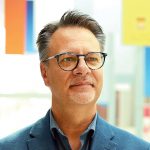
“I have had my lab here for 20 years now. You have people from all over the world with different perspectives, different approaches to science, and it’s a really productive environment where you can learn to do anything.”
Michael Czubryt [B.Sc.(Hons.)/90, PhD/00], professor, physiology and pathophysiology
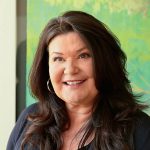
“The creation in 2017 of Ongomiizwin, the Indigenous Institute of Health and Healing, [has given us] the largest Indigenous health program of any college of medicine throughout the country.”
Melanie MacKinnon [BN/96], head, Ongomiizwin – Indigenous Institute of Health and Healing
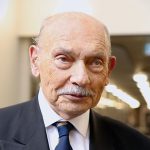
“[There has been] a general thrust towards more inclusivity, rather than exclusivity, in everything that we do. A colleague of mine used to say, ‘The medical school should have its head in the clouds, but its feet in the community.’ That has been a major feature of our medical school.”
Arnold Naimark [B.Sc.(Med.)/57, MD/57, M.Sc./60], president emeritus, UM; dean emeritus,
Max Rady College of Medicine
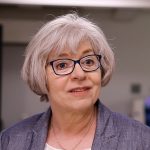
“The George & Fay Yee Centre for Healthcare Innovation has attracted world-class faculty to support patient-oriented research. On the basic science side, we’ve developed amazing platforms – proteomics, transgenic services – right here in Manitoba.”
Barbara Triggs-Raine [B.Sc.(Hons.)/83, PhD/87], professor and department head, biochemistry and medical genetics
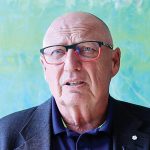
“We continue to work on issues of equity, diversity and inclusion and to pay attention to the health of Indigenous people. All of those things need to continue if we are ever going to achieve reconciliation.”
Brian Postl [MD/76], dean emeritus, Max Rady College of Medicine and Rady Faculty of Health Sciences
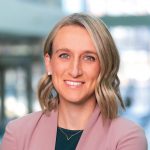
“One of the absolute highlights of going to UM for medical school was the emphasis on rural and remote health. I had the chance to go to Norway House, to Churchill, up to Nunavut, and learn not only from the health-care providers, but also from the locals who had such expertise beyond what I could have learned in a classroom.”
Joss Reimer [MD/08], chief medical officer, Winnipeg Regional Health Authority; president-elect, Canadian Medical Association
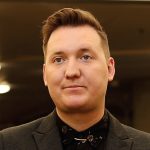
“Back in 2016, my classmate Tharuna Abbu [B.Sc./13, MD/17] and I launched the Positive Space campaign on campus. Together, we helped facilitate the first Pride ceremony at UM and the inaugural Pride flag-raising ceremony. Now we can see that Pride has a permanent home here.”
Shayne Reitmeier [MD/17], rural family physician; UM Distinguished Alumni Award winner
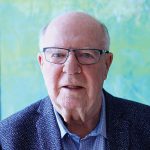
“The creation of the Access program allowed a pathway for Indigenous students to study medicine. Also important was the establishment of the community health sciences department, which meant [the medical school] played a role in the health of the province as a whole.”
John Wade [MD/60], dean emeritus, Max Rady College of Medicine
